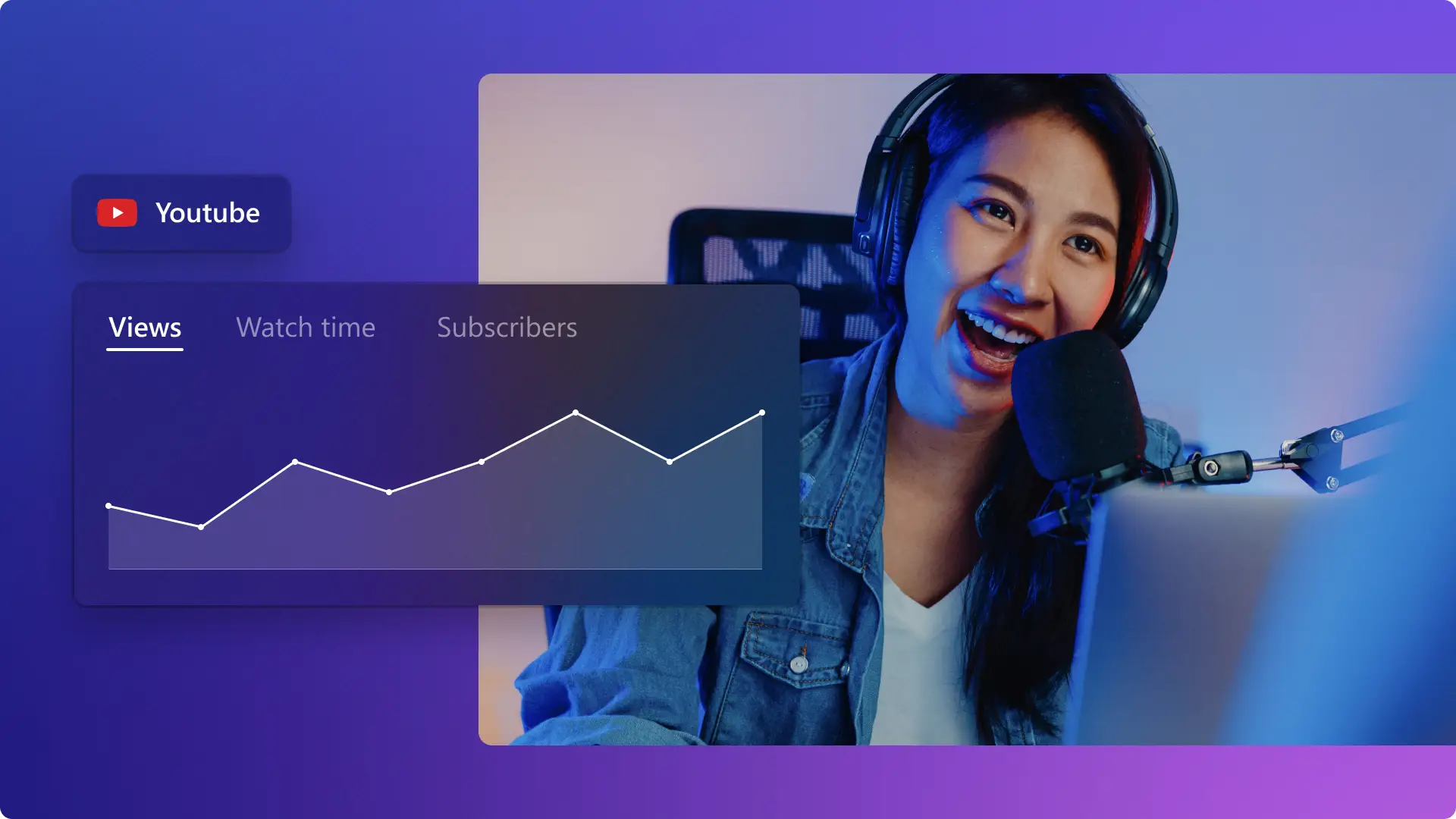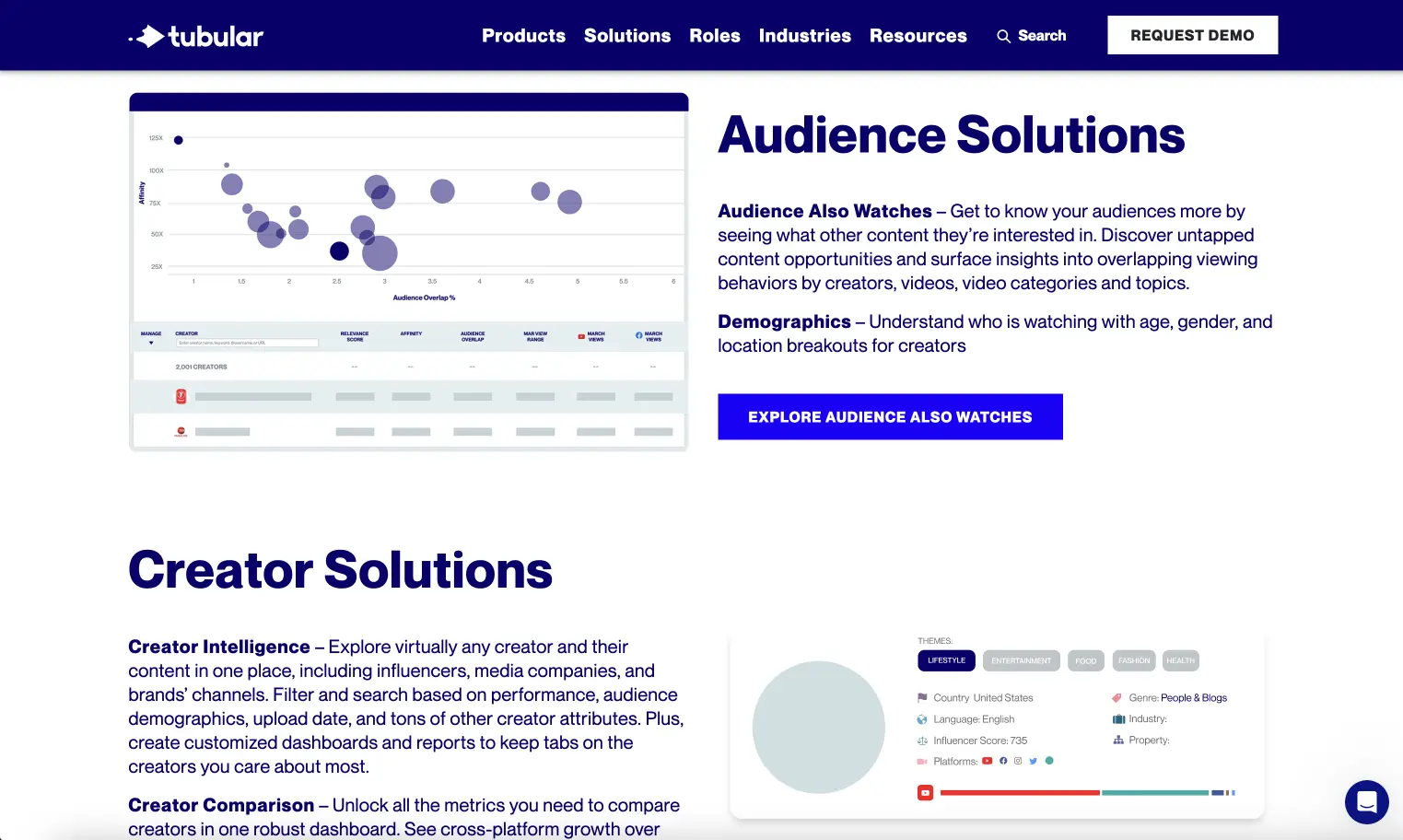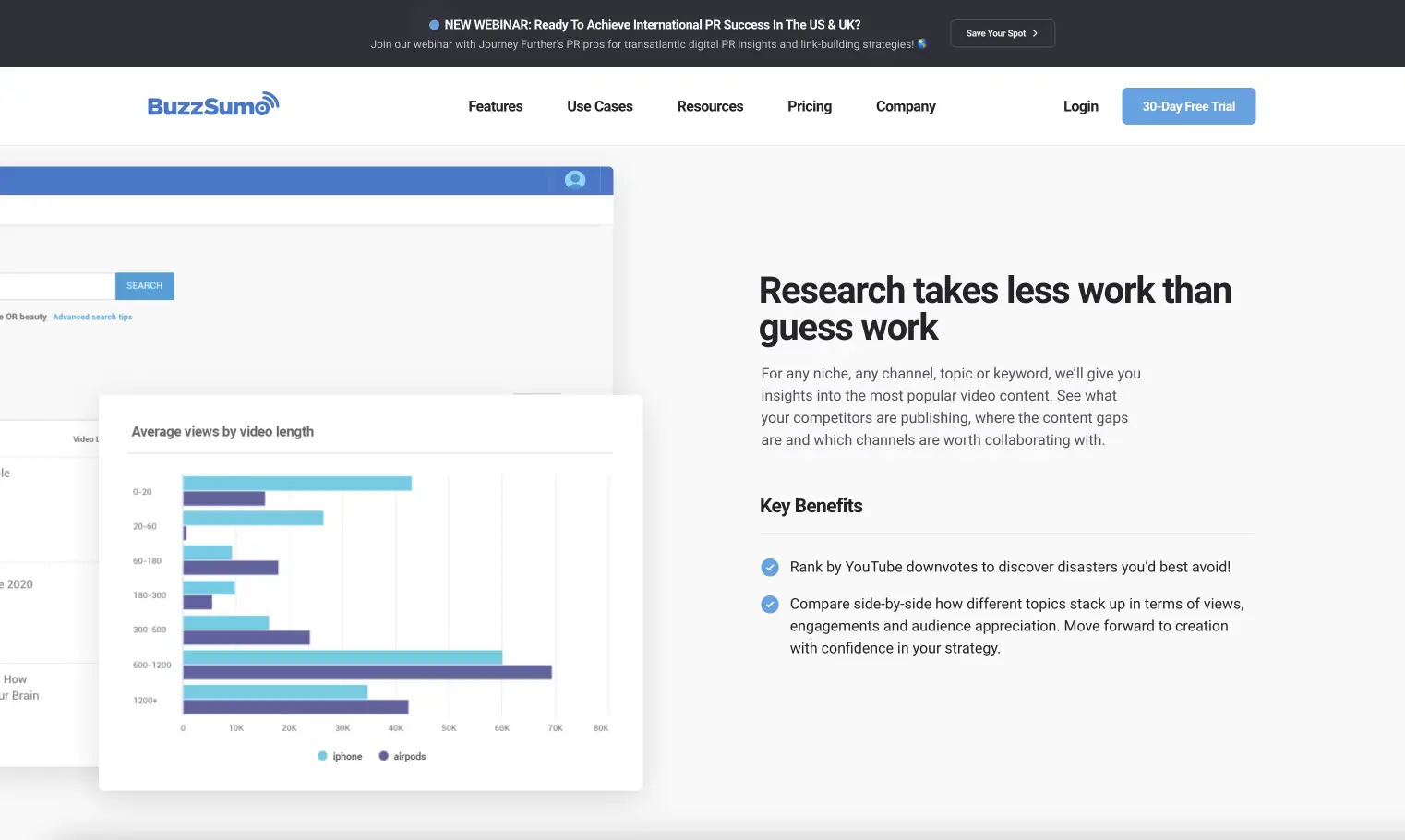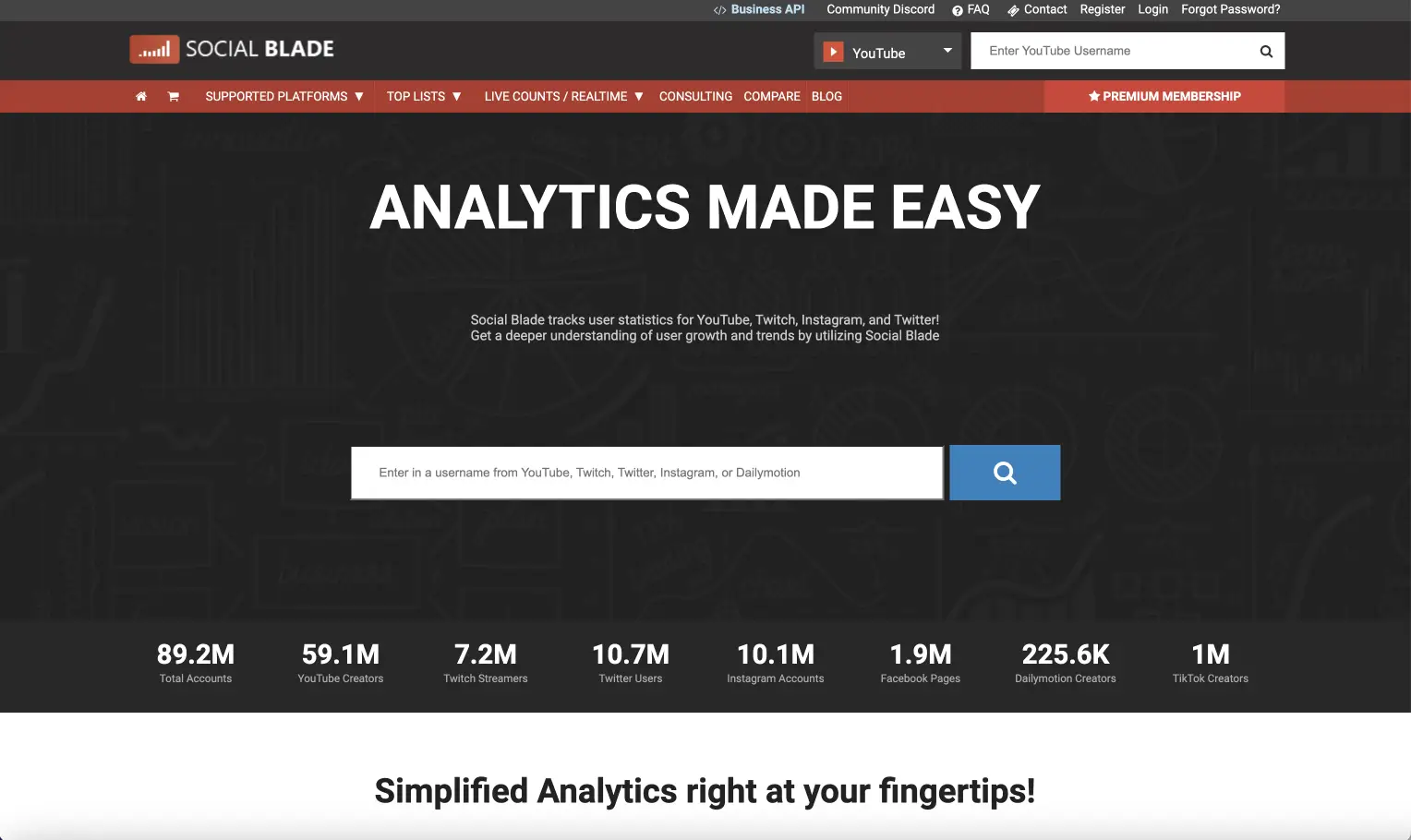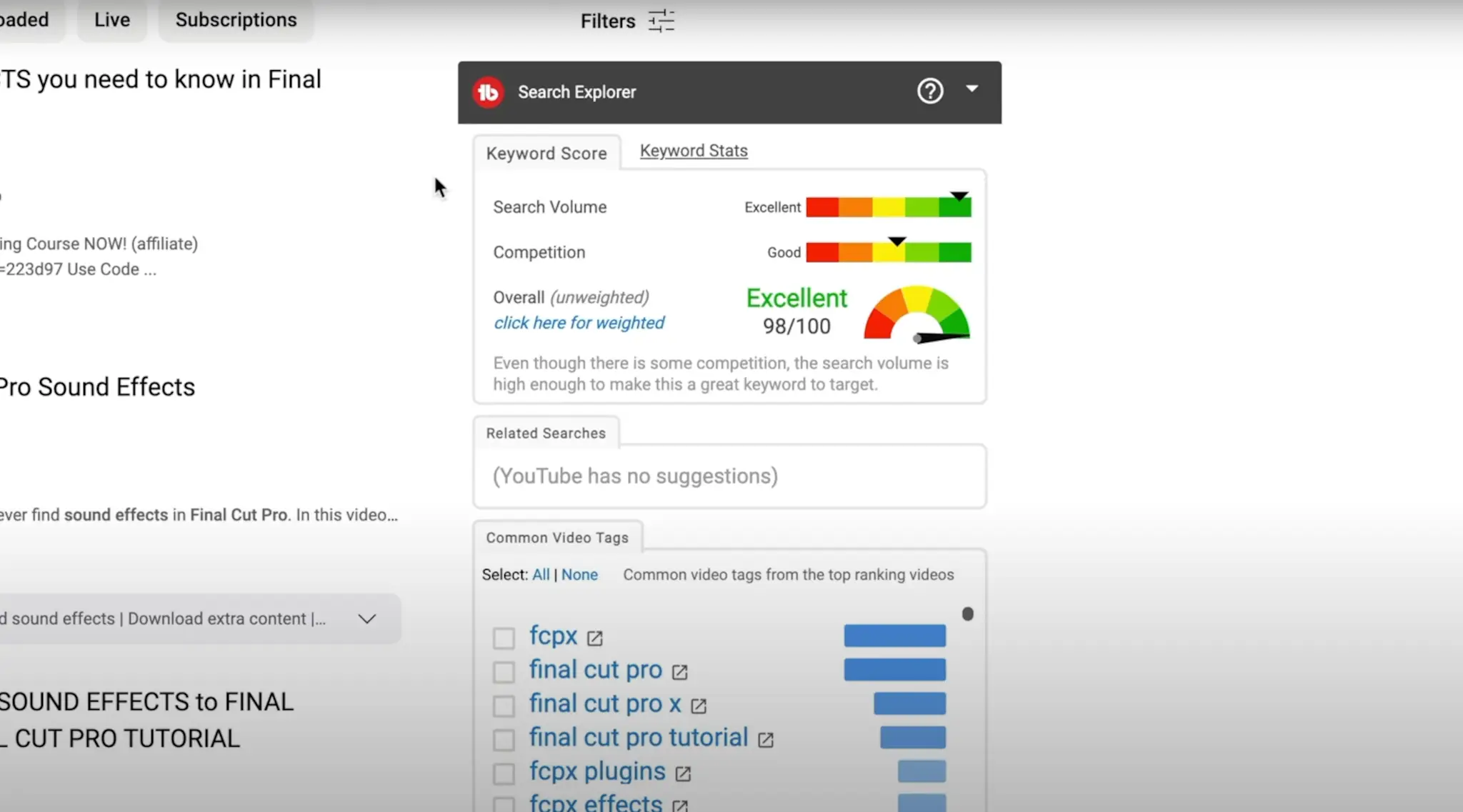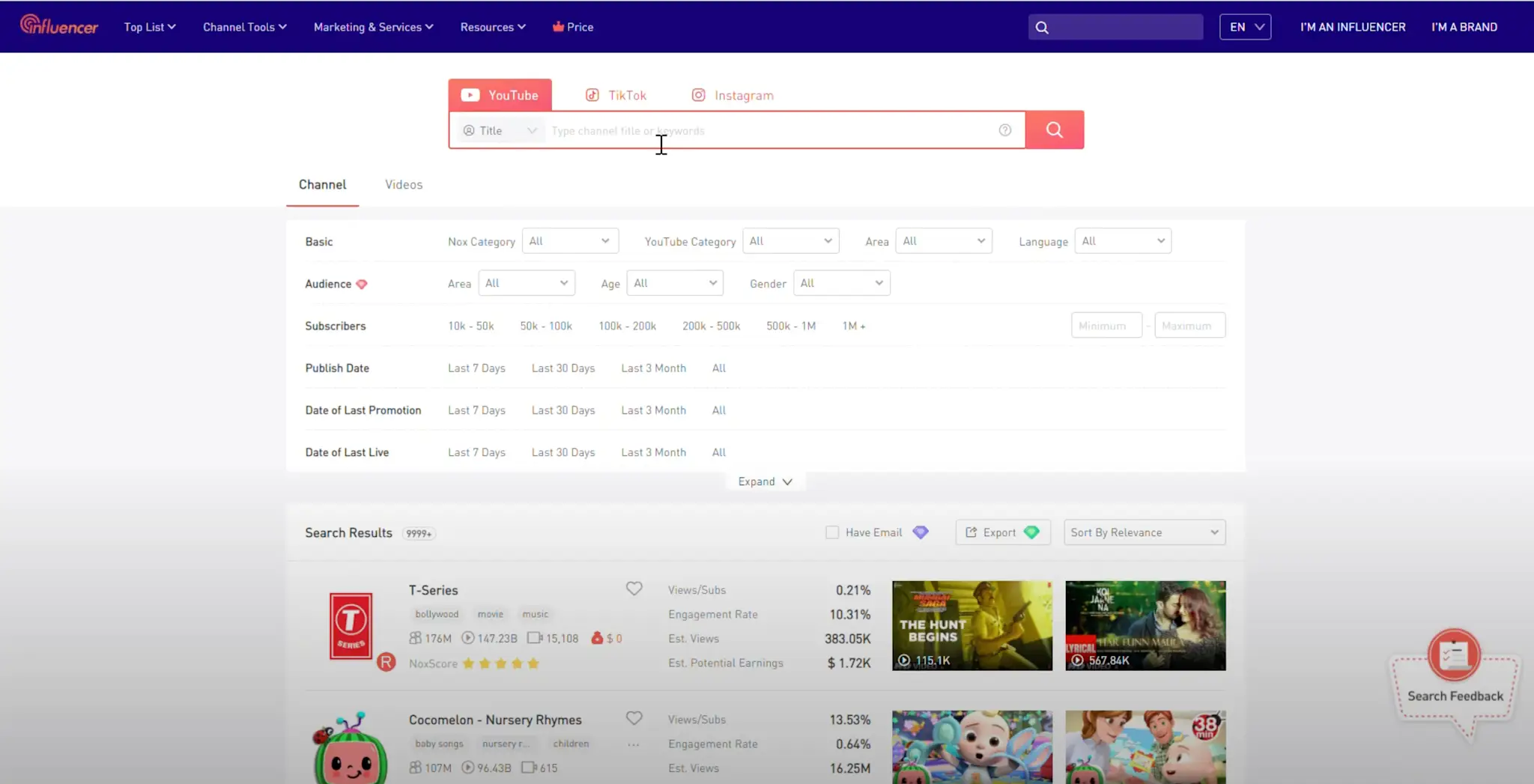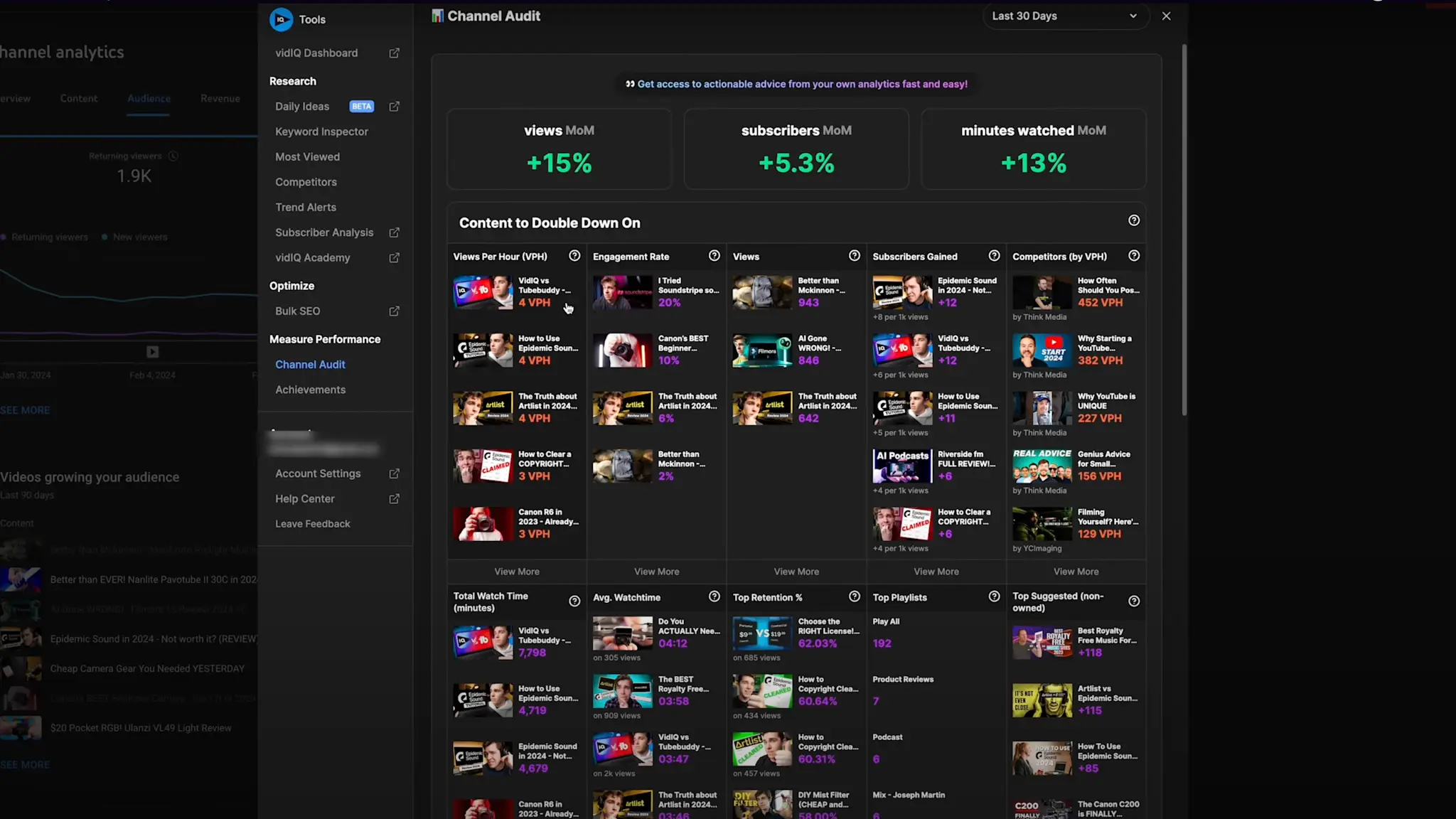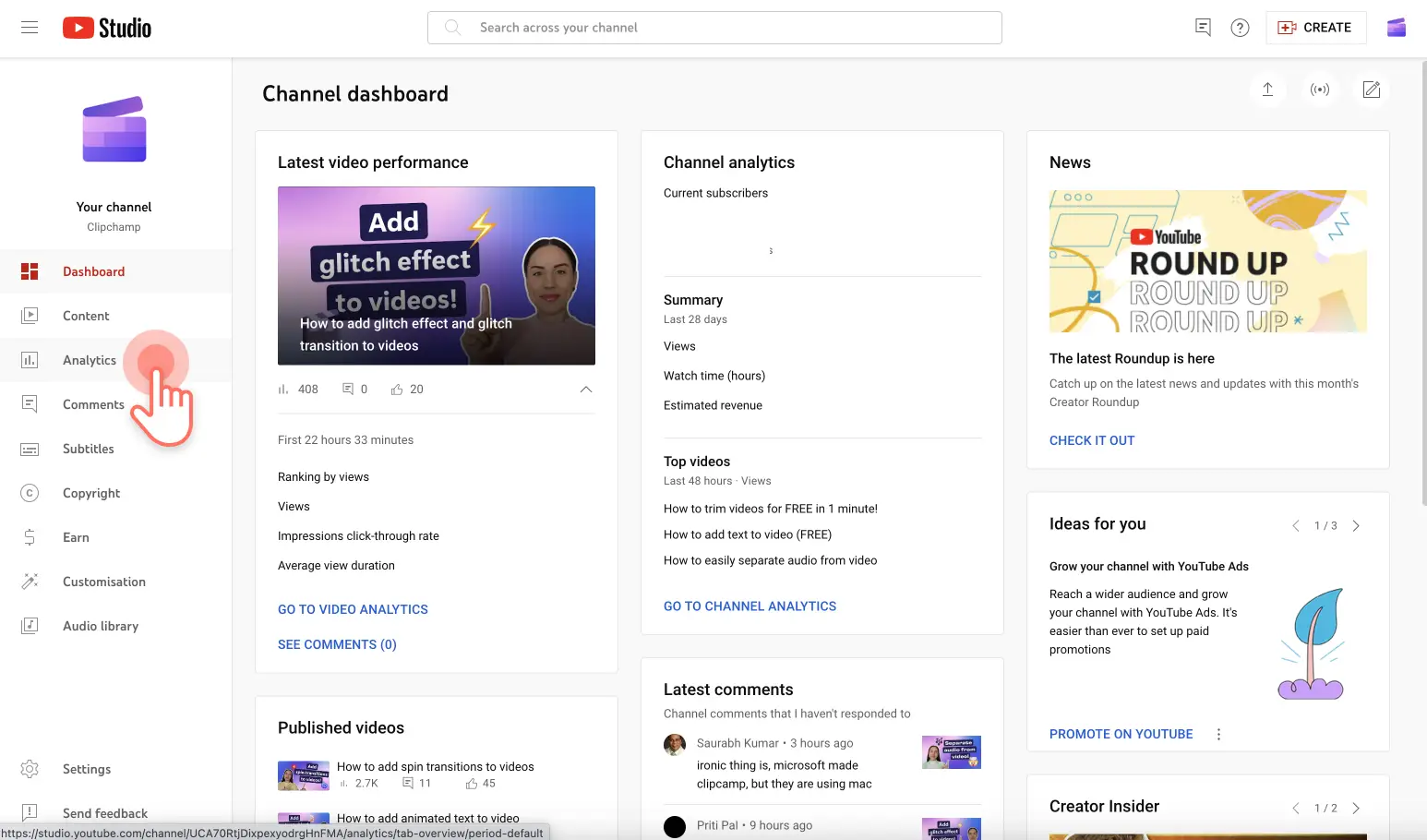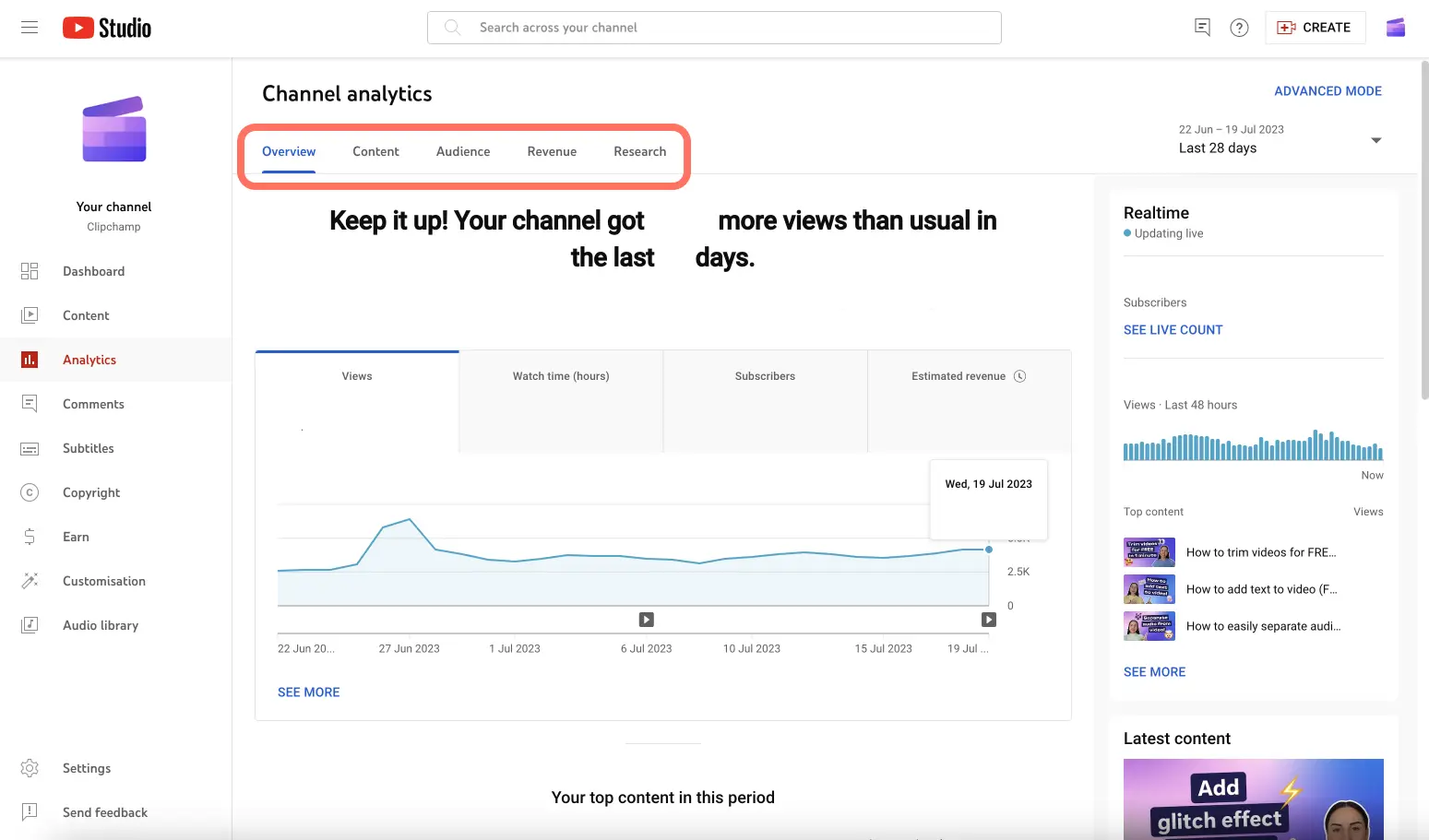Heads up! The screenshots in this article are from Clipchamp for personal accounts. The same principles apply to Clipchamp for work and school accounts.
On this page
- What are YouTube analytics?
- How to use YouTube analytics to level up videos
- How to see YouTube channel analytics for other creators
- How to view own analytics in YouTube Studio
- How to find overlapping competitors in YouTube Studio (desktop)
- How to use YouTube Studio trends to find video topics (mobile)
- How to export channel data for analysis
- Bonus tips to grow a YouTube channel fast
Transform any YouTube channel into a powerhouse of engaging content using YouTube analytics and insights from competitors. Enhance video planning, scripting, and YouTube video editing by learning from inspiring or similar content creators.
By tracking competitor YouTube analytics using third-party tools and methods, understand key metrics like average view duration, target audience profiles, and more, to unlock YouTube channel growth.
Explore the top analytics tools and dive into YouTube Studio features like audience cards and trends to uncover what's working across YouTube in this helpful guide. When you're ready, apply these tips to create showstopping YouTube videos and Shorts with Clipchamp video editor.
What are YouTube analytics?
YouTube Analytics is a powerful tool for YouTubers to monitor and evaluate the performance of videos and channels. With YouTube analytics, track a variety of key metrics.
Views which show how many times videos have been watched.
Watch time which enables understanding how long viewers are spending on videos.
Audience demographics which can help learn about viewers' age, gender, and geographic location.
Traffic sources reveal where viewers are finding videos from, such as search, suggested videos, external websites.
By analyzing these metrics, YouTubers can gain valuable insights into what's working and what needs improvement. This enables making informed decisions to enhance content and grow an audience.
What you can and cannot see on YouTube analytics
Creators cannot see another channel’s watch time, AVD, or retention graphs. Instead, creators can see public metrics. These metrics are the closest thing to 'competitor analytics' that YouTube reveals. YouTube gives two useful signals inside YouTube Studio, and these appear on the audience tab in YouTube Studio on desktop. Including, what the audience watches and what channels the audience watches.
Types of YouTube analytics and statistics
These are the different types of YouTube channel statistics that can be viewed for your own channel.
Click-through rate
Average video watch time
Video view duration
Audience retention rates per video
YouTube descriptions
YouTube thumbnails
YouTube subscriber charts
Video publishing times
Target audience for YouTube channel and videos
Sponsored video statistics
How to use YouTube analytics to level up videos
Identify top-performing videos
Look at views and watch time to check which videos have the highest views and watch time in your YouTube channel. Identify common themes, topics, or formats that made them successful. Try to replicate these elements in future videos. For example, if tutorial videos get the most views, consider creating more content in that style.
Analyze audience retention
Check the audience retention report to see where viewers are dropping off in YouTube uploads. This insight will help understand which parts of the videos might be less engaging. For instance, if viewers drop off after the first minute, work on making a captivating YouTube intro video.
Understand traffic sources
Find out where viewers come from. Use the traffic sources report to discover how viewers are finding videos. Continue to optimize video titles, YouTube video description, channel description, and add YouTube tags to attract more viewers from those sources. For example, if a significant number of viewers come from search, focus on improving video SEO.
Monitor demographics
Learn about your audience and understand their age, gender, and location to tailor content to their preferences. For example, if the audience is primarily teenagers, create content that appeals to younger viewers.
Track engagement metrics
Look at likes, comments, and shares. These metrics show which videos resonate most with viewers. Engage with the viewers in the comments to build a YouTube community. For example, remind viewers to interact with the channel by adding like and subscribe buttons to the outro video, publish YouTube polls, and respond to comments to create a sense of community.
How to see YouTube channel analytics for other creators
Use YouTube analytics tool: Tubular Intelligence
Easily analyze YouTube channel insights with Tubular Intelligence. Their smart technology lets you see what’s trending on YouTube, the highest-watched videos from target audiences, and what video content subscribers are enjoying the most. Best for agencies and brands that need cross-platform competitive dashboards. Request a demo for pricing.
Use YouTube analytics tool: BuzzSumo
BuzzSumo analyzes YouTube channels from your competitors to find video ideas based on what’s trending through keyword research. Great for finding winning topics/formats and creators, but should be used alongside a channel analytics tool. The platform is available for creators and competitors to view and offers paid and free payment options.
Use YouTube analytics tool: Social Blade
Social Blade is the perfect tool to give you YouTube insights about specific subscriber behaviors and views of your competitors. You can also find out how your video competitors are performing and what content they’re posting just by using the search bar. Metrics are public or modeled, not a substitute for private Studio data. The platform offers paid and free payment options.
Use YouTube analytics tool: TubeBuddy
TubeBuddy is a browser extension that helps you manage, create, and grow your YouTube channel. If you type in a video genre you want to create in the YouTube search bar, TubeBuddy will tell you how likely you are to rank in the specific search. There are both free and paid options.
Source: Modern Millie
Use YouTube analytics tool: NoxInfluencer
The tool NoxInfluencer provides detailed analytics for YouTube channels, including subscriber growth, video performance, and engagement metrics. Simply enter the channel name, and NoxInfluencer will offer insights into the channel’s performance, helping you track competitor trends and audience preferences. There are both free and paid options.
Use YouTube analytics tool: VidIQ
VidIQ is an advanced analytics and SEO tool designed to help YouTube creators optimize their videos and grow their channels. By analyzing competitor strategies and providing keyword opportunities, VidIQ offers actionable insights to enhance your content’s visibility and performance. Use trending keywords and daily ideas tools to map competitor topics, then validate with your audience cards in YouTube Studio. There are both free and paid options.
How to view own analytics in YouTube Studio
To track YouTube stats to your own channel, head over to YouTube Studio and click on the analytics tab on the left toolbar.
Next, in the analytics section, click on either the overview, content, audience, revenue, or research tabs to view your YouTube channel statistics in more detail.
How to find overlapping competitors in YouTube Studio (desktop)
In YouTube Studio, navigate to analytics then audience.
Scan the cards what your audience watches and channels your audience watches.
List the top five overlap channels, note upload frequency, whether it's YouTube Shorts or long-form split, and any recurring topics.
Revisit monthly to see shifts.
How to use YouTube Studio trends to find video topics (mobile)
In YouTube Studio, navigate to analytics then trends.
Check top searches for your audience and saved topics over the last 28 days.
Capture the top terms, then compare to competitor titles, thumbnails, and formats.
How to export channel data for analysis
In YouTube Studio, navigate to analytics then advanced mode.
Choose date range and metrics.
Click export current view and download CSV.
Track views, posting cadence, and topic clusters month over month.
Bonus tips to grow a YouTube channel fast
YouTube research shouldn't end with analytics. YouTube insights can be discovered through other methods as well.
Take note of popular video formats: if competitors have similar target audiences and demographics, explore what style of video content is the most popular on their YouTube channel like vlogs, tutorials, reviews, unboxing videos, among others.
Subscriber and viewer requests: scroll through the comments section on popular videos to find out what videos and topics viewers are asking for. Use this valuable information to create your next video.
Video titles with keywords: video titles and descriptions should always include popular keywords associated to the niche to help rank videos higher
Eye-catching video thumbnails: create thumbnails following bold colors and designs to increase the video click-through rate.
View intro and outro videos: discover if the competitors includes YouTube intros and outros in their video content and follow their example.
Explore more practical YouTube editing tips like how to resize YouTube videos for Instagram, or learn how to prompt AI to write YouTube scripts.
When you're ready to edit YouTube videos easily with video templates, free stock, and AI subtitles, try Clipchamp video editor or download the Microsoft Clipchamp Windows app.
Frequently asked questions
Are creators notified if I check out their YouTube Analytics?
If you use any of the third-party YouTube analytics tools suggested above, the competitor will not be notified that you have viewed their dashboard.
Will I get more subscribers by viewing competitor YouTube channel analytics?
You can identify popular content and trends to create more engaging videos by analyzing competitors. Use insights to improve content, stay unique, and consider YouTube advertising to attract more subscribers. Planning and research are key so keep reviewing competitor videos then create a creative twist. Check out this ultimate guide to vlog editing for more tips.
What do my social media engagement metrics mean?
Social media engagement measures how actively your audience interacts with your content, not just follower count. Key metrics include watch time, click-through rates, comments, likes, and shares. YouTube metrics help you understand the success of your videos and audience engagement. Learn more in our article on social media engagement metrics.
Can I see another channel’s watch time, AVD, or CTR?
YouTube does not share private analytics across channels. Use public metrics, Studio audience cards, the Trends tab, and third-party estimates.
